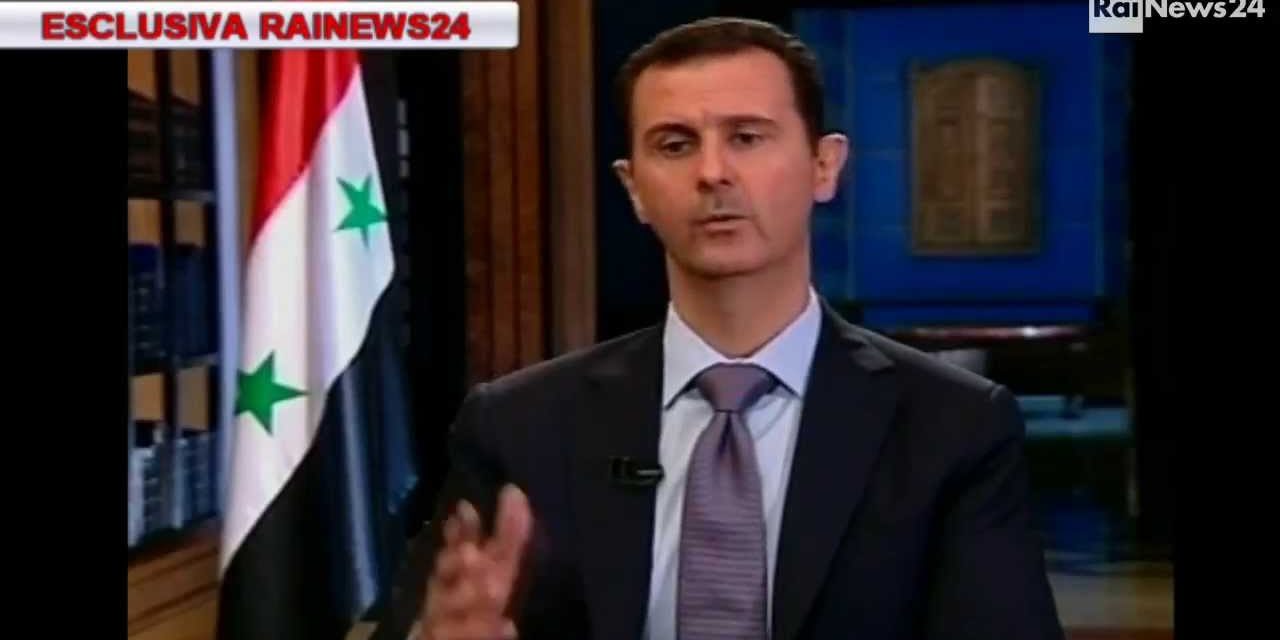Syrian President Bashar Al Assad has given an interview with Italy’s Rai News, in which he discussed the UN Security Council Resolution on dismantling Syria’s chemical weapons, the possibility of a political solution to the conflict, and the August 21 chemical weapons attacks.
Regarding the August 21 attacks, Assad appeared to contradict himself, offering a rationale for why the Syrian Arab Army could not have carried out the attacks. Assad first blames the attacks on the insurgency, arguing that the regime has evidence, including “confessions” from “terrorists” who brought chemical weapons from outside Syria.
However, the President goes on to describe how difficult it is to carry out a chemical attack. Chemical weapons, he says, are “not like a grenade”. He adds that specialized units are needed to handle the weapons, so an attack could not just have happened without authorization, “you have specialized units, and if you want to use it, these specialized units should join the army in order to use the chemical weapons.” Carrying out such an attack, Assad continues, is “complicated technically first of all to activate the material itself…”
Assad does not elaborate on how the “armed groups” could carry out such a large-scale, specialized attack using home-made chemicals.
Apart from saying that chemical weapons use would have required authorization and involvement from specialized regime units, Assad argues that the regime logically could not be responsible for the August 21 attacks because, “you don’t use it when you’re in advancement. The army was advancing.” Was it? Well, no. In the weeks and days before the attack, the regime was at best in a “dynamic stalemate” in the Damascus suburbs, and had failed to made advances into key towns and neighborhoods, including Moadamiyyat Ash Sham, Irbeen, Jobar, Barzeh and Qaboun. In fact, in the day s leading up to the attacks, the regime had been hit by insurgent shelling from inside Jobar on positions in central Damascus.
On the UN Security Council Resolution that Syria get rid of its chemical weapons:
* “The main part of the Russian initiative is based on our will to do so. So, it’s not the resolution. Actually, it’s about our will. Of course, we have the will…”
* “Of course we have to comply; this is our history: to comply with every treaty we sign.”
* “Our role is to offer the data and to facilitate their procedures [for dismantling the weapons].”
On a political solution to the crisis
* “It’s about the Syrians meeting around the table, discussing the political system that they want, the future of Syria, and whatever they agree upon, you’ll have a referendum in order to have the endorsement of the Syrian people regarding whatever part of the future of Syria, whether it’s the constitution, or laws.”
* “We discuss with every party of opposition but not armed groups…. Regarding the militants, if they give up their arms, we’ll be ready to discuss with them anything like any other citizen.”
On Geneva II and who will attend:
* That [whether Assad attends Geneva II] depends on the framework of the Geneva meeting. So far, that conference is not clear: what kind of conference, who’s going to attend, what the criteria are for this conference.
* “We cannot negotiate with the people who ask for foreign intervention and military intervention in Syria.”
* “[Saudi Arabia and Qatar] are client states… their master is the United States. We all know that. So, if the United States is attending, this is the main partner, and the others are accessories…”
On whether international peacekeeping troops could be part of a solution:
* “It doesn’t work, because we’re not talking about two countries fighting each other, like, for example, Syria and Israel, where you have a frontline…It’s completely different. You are talking about gangs; they could exist everywhere in Syria… So, even if you want to suppose that you can accept that idea – which is not acceptable for us – but if you want to accept it, where can you position those troops?”
On the role of Iran in a political solution:
* “We trust the Iranians and they, like the Syrians and many other countries, don’t trust the Americans…”
* “For the Iranians to move closer to the Americans is not just a naïve move; it’s a well-studied step that’s based on the experience of the Iranians with the United States since the revolution in 1979.”
On the August 21 chemical weapons attacks:
* “The Syrian Army didn’t use it at all. It never arranged to use chemical weapons during the crisis.”
* “We have complete evidence, like the materials, containers that the terrorists used, we have the confessions of some of the terrorists that conveyed chemical materials from neighboring countries.”
* “It’s not a grenade, you put it in your pocket and throw it on everyone. The process of using the chemical weapons…it is very complicated, it’s under strict procedure because it’s complicated technically first of all to activate the material itself.”
* “Not a single unit in the Syrian Army has chemical weapons anyway…”
On how the Assad regime has dealt with the conflict:
* “That’s normal, what we did, according to the constitution. This is the job of the government. If you talk about mistakes committed on the ground that could happen anywhere in the world. In the UK a few years ago, they shot a Brazilian guy by mistake, so that could happen anywhere…”
On reform:
* “We need the reform. Without reform, we cannot. The reform is a very part of what I’m talking about. Actually, it’s the major axis of making Syria better, that’s for sure, but doesn’t mean to be the hope in that regard of foreign countries or foreign people; I could be the hope of the Syrians, not any other one.”

